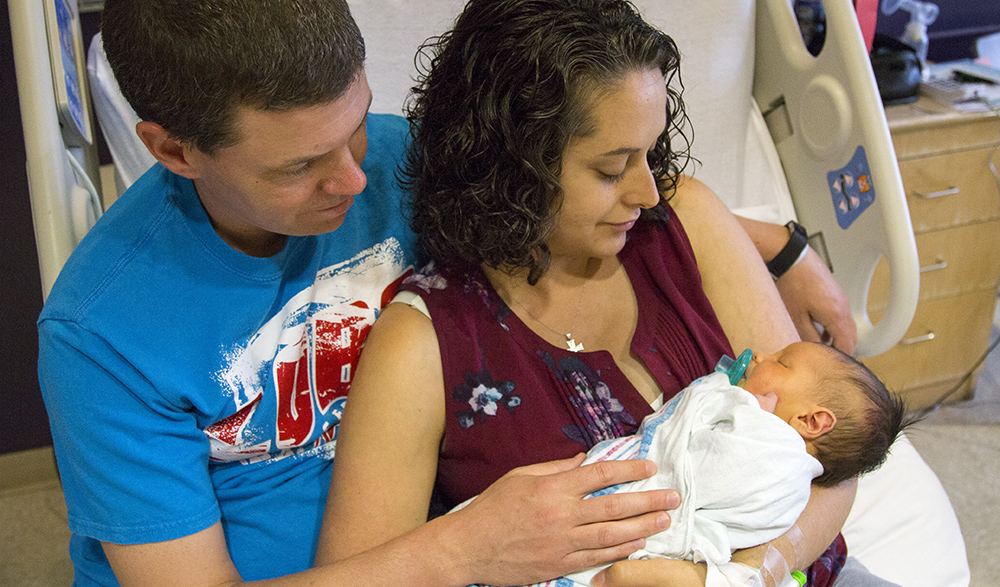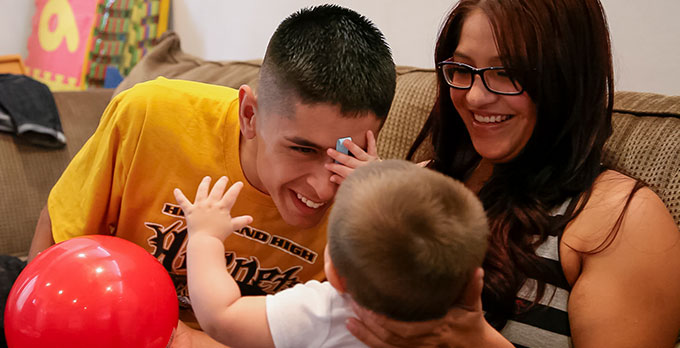Having a new baby can cause a range of emotions for new parents, from excitement to sadness and everything in between. While a few days of rollercoaster feelings are normal, approximately 1 in 7 women develop postpartum depression (PPD)—a more serious condition that can cause intense feelings of sadness and depression.
However, men can experience depression and anxiety as new dads, too. Paternal postnatal depression (PPND) affects around 10% of men. It occurs more frequently 3 to 6 months after delivery.
Often, PPND goes unnoticed in men, in part because their symptoms are different from women. Loved ones and health care providers are more likely to ask how the new mom is doing. And many men feel like they must “be tough” and not ask for help—or not recognize damaging emotions at all.
It is important that mom takes care of herself and her new baby. She should also keep an eye out for her partner’s symptoms and encourage him to seek help, if needed.
Men’s Symptoms Are Different
New moms with PPD struggle internally with feelings sadness, hopelessness, or guilt. Some worry they are not a good mom and second-guess their decisions.
Men’s symptoms are typically more external and may include:
- Acting violent towards others
- Becoming easily triggered or frustrated by little things
- Engaging in destructive conflict
- Experiencing thoughts of suicide or self-harm
- Feeling angrier than usual
- Having issues bonding with the infant
- Increasing use of alcohol or drugs
- Isolating from loved ones
- Losing interest in work, hobbies, socializing
- Over-working to avoid being home
- Risk-taking or impulsive behavior
- Sleeping issues, unrelated to baby’s schedule
Call your doctor if symptoms get worse or last over two weeks. If he tells you he is having thoughts suicide or self-harm, call 911 or the National Suicide Prevention Lifeline at 800-273-8255 immediately to get help.
Certain Factors Put Him at Higher Risk
Maternal postpartum depression is the strongest predictor of paternal PPD. However, it’s no one’s fault. If the mother has PPD, another family member or trusted friend should watch the father for symptoms.
His risk factors may include:
- Being overwhelmed by expectations
- Exhaustion from lack of sleep
- Family history of depression or other mental illness
- Financial issues or unemployment
- Insecurities about becoming a parent
- Personal history of depression
- Relationship issues with spouse or partner
- Unplanned pregnancy
Changing hormones puts women at risk. However, men also experience hormonal changes, such as declines in testosterone. This also puts them at risk for PPD.
A new dad with symptoms or risk factors may not have PPND, but he might. Know these risk factors and watch for sudden, abnormal behavior changes.

Attention, Dads: Your Health and Lifestyle Affect Baby, Too
Steps dads need to take to improve their health, and that of their baby and partner.
How to Support Him
Before diagnosis:
- Get screened: His doctor can conduct a professional depression screening.
- Educate yourselves: Learn about depression and talk about it openly.
- Attend parenting classes: Learn to identify signs of PPND and healthy ways to discuss it.
After diagnosis:
- Get mental health counseling: Work with a psychologist or therapist for an outside perspective and for healthy coping tools.
- Join an online or in-person support group: Talk with others going through a similar situation.
- Consider medication: Antidepressants can help with depression symptoms, and it is not a sign of weakness to get help. For example, Zulresso (brexanolone) was approved by the US Food and Drug Administration (FDA) as a treatment for PPD.
PPND is not as well-known as PPD, but it is as serious. It can negatively affect a baby’s brain and child’s overall development. Relationships can suffer. If not treated, PPND could go on for years and harm the entire family. However, there is hope. Continue to raise awareness and normalize this condition. Keep the conversation going.

